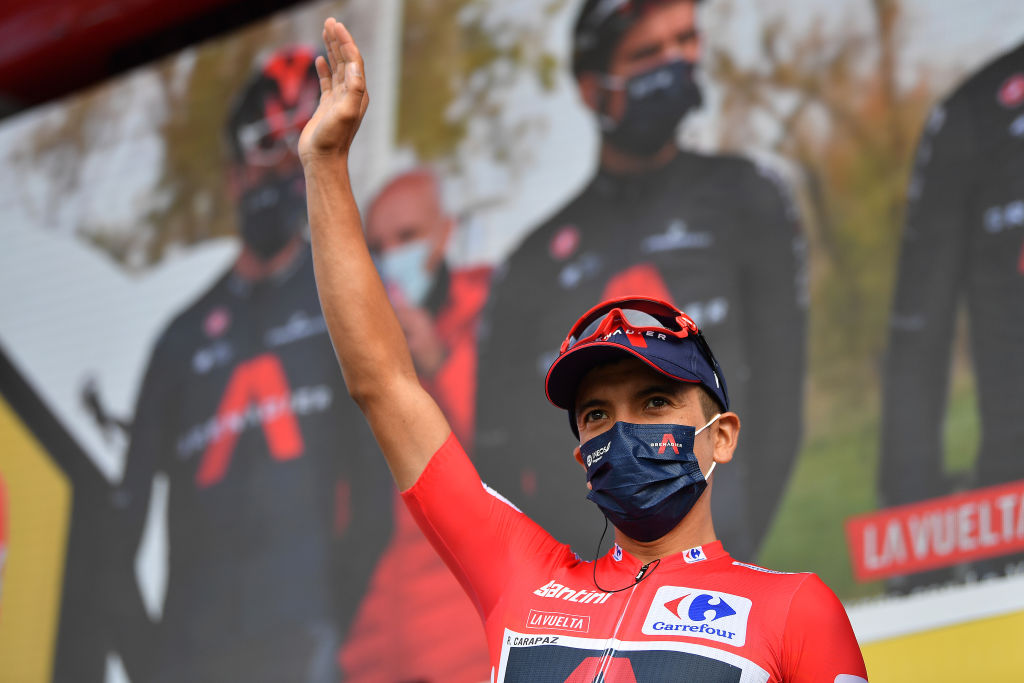Race leader Carapaz loses time but insists Vuelta a España remains wide open
Ecuadorian points to Martin and Roglič as strongest rivals

Richard Carapaz (Ineos-Grenadiers) dug deep to retain overall control of the Vuelta a España on Wednesday’s stage 8 summit finish, but to judge by one of the most enthralling climbing duels of the 2020 season, the Ecuadorian now faces the fight of a lifetime against defending champion Primož Roglič (Jumbo-Visma).
In a ferocious, multi-sided mountain battle, first Carapaz had to face off a blistering collective effort by Movistar as ’the Blues’ simultaneously sought to isolate the race leader and set things up for their contender Enric Mas. But then Hugh Carthy and Mike Woods (EF Pro Cycling) came to the fore on the slopes of the Moncalvillo and after a savage, little late move by Astana’s Alexandre Vlasov, Carapaz and Roglič finally managed to put daylight between themselves and their rivals with less than a kilometre to go.
However, the day was far from done. And as the two locked climbing swords for one last time on a relentlessly rising uphill straightaway, Carapaz’s effort to shake off Roglič was met with a more commanding answer that gave the Slovenian an initial 100-metre advantage. Television foreshortening made it look like Carapaz was closing the gap on Roglič, but in fact the gap between the two opened to 13 seconds by the finish line.
On current evidence and in terms of climbing form, Carapaz - second on Wednesday's stage but still the overall leader - and Roglič - Wednesday’s stage winner and now second overall - are a cut above the rest. But the gaps remain relatively small, as five riders are within a two-minute margin or less at the top of the GC table, and with the hardest mountain stages still to come. Carapaz argued the 2019 Vuelta and Giro winners cannot yet afford to see this year's race as a straight two-man battle.
“It was very emotional, that kind of mano-a-mano duel brings me back to former encounters,” Carapaz, who fended off Roglič in last year’s Giro d’Italia, told reporters afterwards. “It was a very beautiful fight, but the race is still very wide open.
“I was trying to attack both for the overall and the stage win, but Roglič's attacks were ones I couldn’t follow. So I kept going and tried to defend myself as best I could.”
Asked if he was pleased because he had defended the lead or whether he was concerned that he now only had a considerably narrower GC advantage, Carapaz said, “overall, I’m happy because of the way the team worked.
Get The Leadout Newsletter
The latest race content, interviews, features, reviews and expert buying guides, direct to your inbox!
“At the end of the day, I can be pleased because we knew that Roglič was the big challenger for this year’s Vuelta, and we’re still up there in the fight.”
Carapaz said that he had expected that the seven-man early breakaway of Wednesday's stage would reach the finish, “but others” - his former team, Movistar, who ripped the break's five-minute advantage to ribbons in the last two hours, “and Jumbo had had other ideas.”
As for whether the race now boiled down to a straight fight between himself and Roglič, he disagreed, saying at least three riders remained as top GC contenders.
“There are tough days and climbs to come before the final and it’s not clear yet what’ll happen there. But after today’s stage, overall the panorama is clearer and I’d say Roglič and [Dan] Martin are the toughest rivals I’ve got.”
Carapaz's biggest strength up to this point in the Vuelta is perhaps that he has been the most consistent on the climbs: not as strong as Carthy on the Formigal stage three days ago, and not as strong as Roglič on stage 8, but not ceding too much time on either occasion.
Whether that steady but unspectacular strategy will be enough to permit him to keep la roja through the mountains of Asturias this weekend, and into the Vuelta's third week, remains to be seen. But it’s a tactic that has won Grand Tours for riders in the past on plenty of occasions.
Alasdair Fotheringham has been reporting on cycling since 1991. He has covered every Tour de France since 1992 bar one, as well as numerous other bike races of all shapes and sizes, ranging from the Olympic Games in 2008 to the now sadly defunct Subida a Urkiola hill climb in Spain. As well as working for Cyclingnews, he has also written for The Independent, The Guardian, ProCycling, The Express and Reuters.
